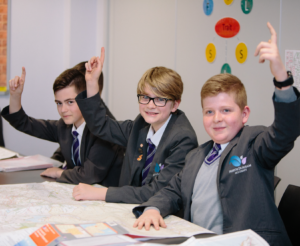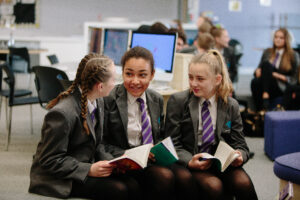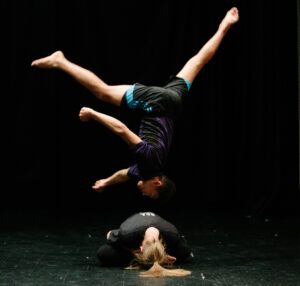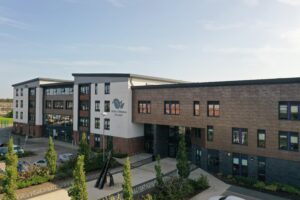Personal Development
Curriculum Intent for RSHE
At North Durham Academy, good relationships are fundamental to our ethos and our success in being a happy, caring and safe environment. Relationships, Sex and Health Education (RSHE) is lifelong learning about relationships, emotions, looking after ourselves, different families, sex education, sexuality and sexual health. We aim for the young people in our Academy to acquire the appropriate knowledge, develop their skills and form positive beliefs, values and attitudes. RSHE has a key part to play in the personal, social, moral and spiritual development of our pupils within the community.
RSHE is taught within all key stages following new 2020 statutory requirements but is also embedded in other areas of the curriculum (such as science) and day to day life of the school where our staff offer support to pupils struggling with their mental health and social relationships. Our students often need extra support to deal with their emotions and maintaining a positive routine is crucial to our school ethos of ‘students first.’ Please see details of our year by year approach.
Our Mission Statement shows that SMSC is at the heart of everything we do at North Durham Academy. We offer a comprehensive learning environment that encourages students to take active control of their learning and behaviour and to embrace challenge. We promote fundamental British Values and students’ spiritual, moral, social and cultural development, helping them to develop into responsible adults. Our mission of putting ‘students first’ defines the core values of LIFE lessons, ensuring that students have the key qualities to prepare for adulthood and are able to become active members of their community.
At NDA, SMSC is very much at the centre of our school. We recognise that the personal development of our students – spiritually, morally, socially and culturally – plays a significant role in their ability to learn, study and mature into well rounded members of the community.
We therefore aim to provide an education that…
- Explores beliefs, religious or otherwise, which inform their perspective on life and their interest in and respect for different people’s feelings and values;
- Fosters a sense of enjoyment and fascination in learning about themselves, others and the world around them, including the intangible;
- Use imagination and creativity in learning;
- Shows students have a willingness to reflect on their experiences:
- Shows we have high standards of behaviour:
- Embodies Spiritual awareness:
- Promotes tolerance and respect for people of all faiths (including those of no faith), cultures and lifestyles through LIFE lessons and extra-curricular activities;
- Includes a rounded programme of assemblies that help to promote students’ SMSC development:
- Students’ have an appreciation of the world around them.
Spiritual Development
We promote this through the following:
- Our LIFE programme which teaches students about different religious denominations.
- Assemblies which celebrate beliefs and cultures from around the world.
- Taking children out on school trips or inviting people into the school that inspire creative learning and aspirations.
- A RSE programme to prepare students.
- Developing creativity and imagination through play, literacy, art, design technology music, dance and drama.
Moral Development
We promote this through the following:
- Providing a clear moral code for behaviour which is promoted consistently through all aspects of the school – assemblies, Choices board, E-safety lessons, Class Charts, merit rewards, attendance awards, Prize-giving days, tutor league tables.
- Promoting equality in relation to religion, ethnicity, disability, sexual orientation or gender.
- Giving students opportunities to explore and develop moral concepts and values through the curriculum – LIFE, History, Geography, English, Drama, Dance and Art.
- Encouraging children to take responsibility for their actions, such as respect for property, care of the environment and the Behaviour Policy.
- Raising money for charities.
- Having a ‘voice’ through the student council.
- Adults modelling fairness, reliability and respect for all students.
- Recognising and respecting different cultures represented by students and staff in the school – tutor programme, Cultural displays around the school, texts used to support the curriculum.
Social Development
We promote this through the following:
- Creating a sense of community with inclusive values through assemblies, our LIFE curriculum, community fundraising, sponsored events, and Open School evening, revision session during the holidays and after school.
- Encouraging children to work co-operatively in the classroom- promoting team work and peer assessment/feedback.
- Providing children with opportunities to exercise leadership and responsibility through student voice.
- Encouraging children to recognise and respect social differences and similarities within Stanley.
Cultural Development
We promote this through the following:
- Participating in local sports matches and competitions.
- Recognising individual talent- NDA’s got talent and Ready Steady Cook competition- cooking cultural foods from around the world.
- Understanding of Brexit and its impact on the UK.
- Themed days linked to topics being studied throughout the school e.g. Spanish, History, and Geography.
- Recognising and celebration of national events such as the World Cup and Remembrance Day.
- Celebrating the attitudes, values and traditions of various cultures
- Through LIFE lessons, assemblies, school social events, and visitors to the school.
British Values
We promote this through the following:
- Tolerance of those of different denominations and beliefs.
- Children are taught about different faiths and cultures around the world, mainly through LIFE lessons and assemblies.
- Staff and students are encouraged to challenge prejudicial or discriminatory behaviour.
- Children are encouraged to respect differences of faith, ethnicity, disability, gender, sexuality, and different families.
Democracy
- Students vote for who represents them on our student voice panel.
- They have a say in what happens in their school and their voices are heard through pupil questionnaires and surveys.
- Children explore the principle of democracy through LIFE lessons and our tutor programme.
Individual Liberty
- Children are taught that everyone has rights and responsibilities.
- They know that everyone needs to work within boundaries to make safe choices.
- Students have the freedom to make choices about joining extra-curricular clubs through our enrichment programme.
Mutual Respect
- Our school motto is “To provide outstanding learning and training for individuals and be recognised as a leading provider of Secondary Education. We have three core principles: Inclusion, Progression and Excellence.”
- Children are encouraged to understand and appreciate that their behaviour affects their rights and the rights of others.
- As an academy, we all work together to help one another.
- Everyone makes all visitors feel very welcome to our school.
- The children learn about and support people less fortunate than themselves through charity work and make regular donations to the local food bank.
- Through the LIFE programme children are taught how laws are made in Parliament- we take part in debates and research the UK parliamentary system.
- We develop understanding of the importance of having laws, and knowing that they protect us and influence our behaviour.
- Children are encouraged to understand the consequences of breaking rules and laws, through discussion and reflection.
- We have regular workshop days from Durham Constabulary looking at issues surrounding anti-social behaviour and Cyber-bullying.
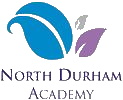
 Parentpay
Parentpay Local Offer
Local Offer




